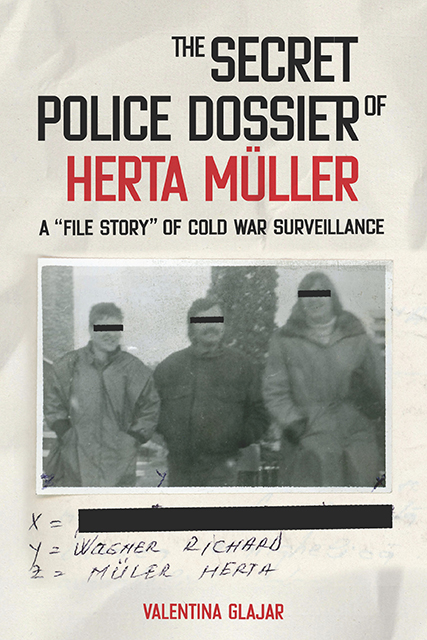Book contents
- Frontmatter
- Dedication
- Contents
- Preface
- Terms and Abbreviations
- Introduction
- 1 The Filed Story of Niederungen
- 2 Contact Stories: The Author and the Officer
- 3 Conspiratorial Stories: The Securitate Sources MAYER, SORIN, and EVA
- 4 Captured Stories: Remote Audio Surveillance
- 5 Migrating Stories
- Epilogue
- Bibliography
- Appendix I Müller’s Surveillance Timeline (1974–93)
- Appendix II Author’s Accreditation by CNSAS
- Index
2 - Contact Stories: The Author and the Officer
Published online by Cambridge University Press: 10 June 2023
- Frontmatter
- Dedication
- Contents
- Preface
- Terms and Abbreviations
- Introduction
- 1 The Filed Story of Niederungen
- 2 Contact Stories: The Author and the Officer
- 3 Conspiratorial Stories: The Securitate Sources MAYER, SORIN, and EVA
- 4 Captured Stories: Remote Audio Surveillance
- 5 Migrating Stories
- Epilogue
- Bibliography
- Appendix I Müller’s Surveillance Timeline (1974–93)
- Appendix II Author’s Accreditation by CNSAS
- Index
Summary
I’ve been summoned. Thursday, at ten sharp. Lately I’m being summoned more and more often: ten sharp on Tuesday, ten sharp on Saturday, on Wednesday, Monday. As if years were a week, I’m amazed that winter comes so close on the heels of late summer.
The very terminology that was used to describe these encounters reflects an inherent relation of power: Müller calls them “interrogations,” while Pădurariu refers to them as “contactări.” An interrogation, or, for that matter, any kind of contact with a Securitate officer, is a dramatization of power relations, as Igal Halfin defines interrogations in his study on archived Bolshevik autobiographies. The officer, regardless of the way they play their role in this dramatization, remains in effect an exponent of the state, while the target is the one in need of disciplining. Just like Foucault's inspectors who transform the social body into a field of perception, Pădurariu, the Securitate officer, accumulates his observations in a series of reports that document most of these meetings. His observations about his targets’ behavior, attitude, and intentions are archived in Müller's and Wagner's files. They allowed him to perceive changes that would confirm that the methods of “influencing the targets positively” were fruitful, or, alternatively, to implement new strategies in order to instill the desired stage of discipline.
Both sides played roles in these meetings that revealed and accentuated their unequal circumstances. However, Pădurariu's targets were not void of agency: they pursued their own interests within the constraints of the dictatorial society in Ceauşescu's Romania. What the Securitate proposed to Müller in September 1984 was the opportunity to travel in exchange for accepting their conditions, which included that of absolute secrecy about their arrangement. Indeed, the question arises as to why anyone would agree to a truce of sorts with the Securitate. Why would one consent to engage with Pădurariu, the representative of an oppressive secret service? One could interpret it as a performative act within an unequal set of power relations, one that implies intent, deliberation, and purpose, as John L. Austin explains the conditions of such an act in “Three Ways of Spilling Ink.” Initiated by the Securitate, the proposal to establish contact with Müller was both intentional and deliberate, and with the clear purpose of “temperare” (mitigation), that is, in Müller's case, of convincing her to refrain from composing any “hostile” writings that portrayed village life in an “unrealistic” perspective.
- Type
- Chapter
- Information
- The Secret Police Dossier of Herta MüllerA 'File Story' of Cold War Surveillance, pp. 80 - 128Publisher: Boydell & BrewerPrint publication year: 2023

